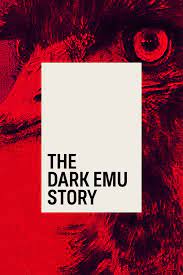
THE DARK EMU STORY
Australia, 2023, 95 minutes, Colour.
Bruce Pascoe.
Directed by Allan Clarke.
In 2014, fiction writer Bruce Pascoe published Dark Emu which was highly acclaimed for its presentation of a different picture of indigenous Australians, not simply hunter-gatherers, but working other fields, aspect of agriculture, mining, fishing, grinding grain… The book won many awards, was highly discussed, 360,000 copies eventually sold.
But, in the ensuing years, controversies emerged, conservative commentators like Andrew Bolt labelled it a literary hoax and critiqued Pascoe for creating an aboriginal background for himself (Pascoe replying that his ancestry was mainly English-Cornish but so many Australians have aboriginal blood, considering the treatment of aboriginal women, for instance, in the Northern Territory in the 19th century and the number of children consequently of mixed race…) The book was more academically critiqued by anthropologist, Peter Sutton, and archaeologist, Keryn Walshe, in their book, Farmers or Hunter-Gatherers, The Dark Emu Debate. They both appear in this film, especially Bruce Pascoe in conversation with Peter Sutton. (After the screening of the documentary on ABC television, Peter Sutton accused it of bias.)
The film features Bruce Pascoe throughout, interviewed, comments to camera, seen at home, travelling to various indigenous sites, explaining his arguments, commenting on the repercussions of the controversy for himself and difficulties for his marriage. The film has been cowritten by director, Allan Clark (The Bowraville Murders) and British documentary director, Jacob Hickey, who began work with the BBC and moved to Australia with a strong catalogue of documentaries and awards.
The case is made that the newcomers to the land, with their colonial attitudes and wanting to work the land, relegated the original inhabitants to the category of hunter-gatherers. However, Pascoe sites various areas of Australia where there were further developments, some sowing and harvesting of crops, the mining of stones and their use for grinding crops, river devices for trapping fish… The assertion is made that the newcomers to the land labelled the aborigines as hunter gatherers, slighting their abilities, an easy dismissal of different sophistication is by the labelling.
Sutton and Walshe are critical of Bruce Pascoe’s limited evidence for his claims. However, the film offers visits to various parts of Australia, the collective evidence – and the indication that so much more evidence could be collected during searches, excavations…
The critics object to the use of the word “agriculture”, considering it a sophisticated word for working the land. In watching the film, we realise that the indigenous people, over the 60,000 years, as might be expected, developed some skills, skills being a keyword, in getting produce from the land, from the rivers, and stone tools have been considered part of any earlier culture.
The film also has the advantage of a number of indigenous speakers, led by Marcia Langton and Stan Grant, indigenous experts in many fields, other commentators on history and culture, and choreographer, Stephen Page, and the Bangara Dance Company and their ballet version of Dark Emu.
With the screening of this documentary, initially on ABC television, the aboriginal voice concerning the Dark Emu story has a new opportunity to assert itself.